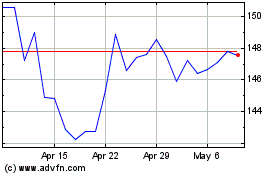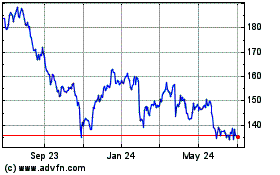ByPaul Page
Sign up:With one click, get this newsletter delivered to your
inbox.
Holiday shopping and shipping is about to get more expensive.
United Parcel Service Inc. is adding a surcharge onto most online
orders around the Black Friday weekend and the week before
Christmas, the latest move by package carriers to recoup the big
investments they make in peak-season deliveries and the higher
costs that come with e-commerce business. The surcharge is a first
for UPS, and the WSJ's Paul Ziobro writes that it's among the
growing add-on charges that have retailers facing the prospect of
either eating the higher costs or passing them along by raising
prices. The explosion in online shopping has created a kind of
tug-of-war between parcel carriers and retailers over the thinner
margins and added complications of delivering goods to homes. The
new UPS charges will apply only to the busiest shopping days, and
only to residential deliveries. That may push retailers to scale up
strategies like in-store pickups of online purchases, something it
appears UPS would also like to see.
Blue Apron Holdings Inc. is pushing forward an initial public
offering just as food delivery is getting big new attention, but
it's unclear whether that will help the startup. The WSJ's Ezequiel
Minaya reports the company is at the center of a growing meal-kit
delivery business that is carving into sales of traditional grocery
stores as consumer change their food-buying habits. With shares
expected to price between $15 and $17, Blue Apron is going public
just as Amazon.com Inc. is plunging into the grocery business,
raising big new questions both for legacy supermarkets and
startups. Amazon's entry could change the game for companies like
Blue Apron and Instacart that have used new technology and refined
logistics to pioneer new paths for food delivery. Blue Apron has
gained nearly $800 million in annual revenue so far, but the debt
and losses also are growing, and well-funded competition from
Amazon could make profits even harder to deliver.
Amazon's surprise deal to buy Whole Foods Market Inc. could
speed up efforts to bring more digital tools like data analytics to
supply chains. Gartner Inc. chief forecaster John Lovelock tells
the WSJ's Angus Loten the "notoriously short shelf life" of food
may push Amazon to put its technology to work across Whole Foods'
distribution channels, from warehousing to deliveries and other
logistics areas. That will give Amazon another area to test its
ability to tie analytics to more sophisticated, data-driven
marketing strategies. Many big grocers already are implementing new
tools to more closely align inventory management and marketing.
Kroger Co. has started using cameras and infrared sensors to track
foot traffic in its stores, and the company is testing sensor-laden
interactive shelves that can detect shoppers in the aisles via
their smartphones and provide personalized pricing and product
suggestions as they shop.
E-COMMERCE
Alibaba Group Holding Ltd. is trying to get U.S. entrepreneurs
to help flip the script on U.S. trade with China. In a two-day
event in Detroit, Alibaba chairman Jack Ma is offering an expected
3,000 U.S. small-business owners tips on how to market and ship
wares to Chinese consumers. It's part of an increasingly urgent
competition between Alibaba and Chinese rival JD.com to tap into
the U.S. market, the WSJ's Liza Lin and Laura Stevens report, and
to corral customers that are starting to move away from the big
sites and toward niche e-commerce providers. To do that, Alibaba
will have to convince sellers it's conquered its problem with
counterfeits. The U.S. last year reinstated Alibaba's Taobao site
to a list of "notorious" marketplaces for fakes, and some U.S.
exporters say they've lost business to cheaper, Chinese-made
knockoffs. Still, American sellers will be tempted by China's $771
billion online retailing market, which is larger than the U.S.
market.
QUOTABLE
IN OTHER NEWS
U.S. new-home construction fell 5.5 % in May, the third straight
monthly decline. (WSJ)
Japan's exports jumped 14.9% in May, the strongest jump since
January 2015. (WSJ)
The unemployment rates in California and six other states fell
to record lows last month. (WSJ)
The U.K. and the European Union concluded their first day of
negotiations over Britain's departure from the bloc. (WSJ)
General Motors Co. will eliminate a shift at a sedan plant in
Kansas City, Kan., laying off about 1,000 people. (WSJ)
Cruise Automation, the startup owned by GM, is creating a
mapping business, a move that could help the auto giant in the race
to develop self-driving vehicles. (WSJ)
A new generation of aerospace startups is disrupting the
attention to traditional operators at this year's Paris
International Air Show. (WSJ)
Boeing Co. lifted its annual 20-year forecast for plane
deliveries to 41,030 jetliners with a value topping $6 trillion at
list prices. (WSJ)
Auto hauler and logistics provider Jack Cooper has reached a
deal with bondholders to restructure more than $400 million in
debt. (WSJ)
Three years after the price of crude began its rapid descent,
the oil industry and investors are finally resigned to the idea of
lower prices for a long period. (WSJ)
EQT Corp. agreed to buy Rice Energy Inc. for $6.7 billion, the
latest proposed tie-up between energy producers after low oil
prices roiled the industry. (WSJ)
Striking truck drivers picketing at the ports of Los Angeles and
Long Beach caused some traffic delays but operations continued
normally at cargo terminals. (Los Angeles Daily News)
Auto supplier Robert Bosch GmbH will build a $1.1 billion
semiconductor plant in Dresden, Germany to meet surging demand for
components for self-driving vehicles. (Bloomberg)
The chief executive of China's JD.com says drones and other
robotics technology should help parcel carriers pare their
logistics costs. (CNBC)
German shipping investment group MPC Container Ships plans to
expand its holdings to 50 vessels and seek a public stock offering
in New York. (Lloyd's List)
DAT says U.S. truckload spot market volume rose 7.3% in May to
its highest level since September 2015. (DC Velocity)
Diesel fuel prices in the U.S. dipped to the lowest level in six
months. (Commercial Carrier Journal)
More luxury fashion brands are buying farms to have better
control of their supply chains. (Business of Fashion)
Egypt will buy 100 new multi-use locomotives from General
Electric Co. for $575 million to upgrade its rail network.
(Reuters)
DHL Express will buy four more A330-300 passenger-to-freighter
conversions from ST Aerospace subsidiary Elbe Flugzeugwerke. (Air
Cargo News)
The share of sellers who use Fulfillment by Amazon is growing in
all countries where Amazon offers the service for its marketplace
users. (Ecommerce News)
ABOUT US
Paul Page is deputy editor of WSJ Logistics Report. Follow him
at @PaulPage, and follow the entire WSJ Logistics Report team:
@brianjbaskin , @jensmithWSJand @EEPhillips_WSJand follow the WSJ
Logistics Report on Twitter at @WSJLogistics.
Write to Paul Page at paul.page@wsj.com
(END) Dow Jones Newswires
June 20, 2017 06:47 ET (10:47 GMT)
Copyright (c) 2017 Dow Jones & Company, Inc.
United Parcel Service (NYSE:UPS)
Historical Stock Chart
From Mar 2024 to Apr 2024

United Parcel Service (NYSE:UPS)
Historical Stock Chart
From Apr 2023 to Apr 2024
